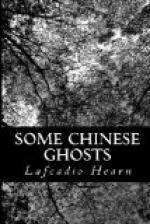So Ming-Y remained, rejoicing secretly in his heart, for Sie seemed to him the fairest and sweetest being he had ever known, and he felt that he loved her even more than his father and his mother. And while they talked the long shadows of the evening slowly blended into one violet darkness; the great citron-light of the sunset faded out; and those starry beings that are called the Three Councillors, who preside over life and death and the destinies of men, opened their cold bright eyes in the northern sky. Within the mansion of Sie the painted lanterns were lighted; the table was laid for the evening repast; and Ming-Y took his place at it, feeling little inclination to eat, and thinking only of the charming face before him. Observing that he scarcely tasted the dainties laid upon his plate, Sie pressed her young guest to partake of wine; and they drank several cups together. It was a purple wine, so cool that the cup into which it was poured became covered with vapory dew; yet it seemed to warm the veins with strange fire. To Ming-Y, as he drank, all things became more luminous as by enchantment; the walls of the chamber appeared to recede, and the roof to heighten; the lamps glowed like stars in their chains, and the voice of Sie floated to the boy’s ears like some far melody heard through the spaces of a drowsy night. His heart swelled; his tongue loosened; and words flitted from his lips that he had fancied he could never dare to utter. Yet Sie sought not to restrain him; her lips gave no smile; but her long bright eyes seemed to laugh with pleasure at his words of praise, and to return his gaze of passionate admiration with affectionate interest.
“I have heard,” she said, “of your rare talent, and of your many elegant accomplishments. I know how to sing a little, although I cannot claim to possess any musical learning; and now that I have the honor of finding myself in the society of a musical professor, I will venture to lay modesty aside, and beg you to sing a few songs with me. I should deem it no small gratification if you would condescend to examine my musical compositions.”
“The honor and the gratification, dear lady,” replied Ming-Y, “will be mine; and I feel helpless to express the gratitude which the offer of so rare a favor deserves.”
The serving-maid, obedient to the summons of a little silver gong, brought in the music and retired. Ming-Y took the manuscripts, and began to examine them with eager delight. The paper upon which they were written had a pale yellow tint, and was light as a fabric of gossamer; but the characters were antiquely beautiful, as though they had been traced by the brush of Hei-song Che-Tchoo himself,—that divine Genius of Ink, who is no bigger than a fly; and the signatures attached to the compositions were the signatures of Youen-tchin, Kao-pien, and Thou-mou,—mighty poets and musicians of the dynasty of Thang! Ming-Y could not repress a scream of delight at the sight




